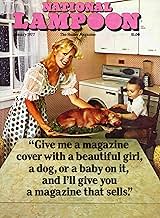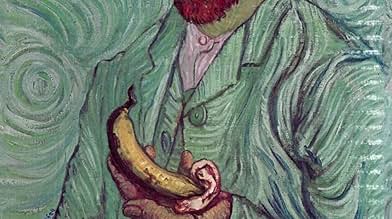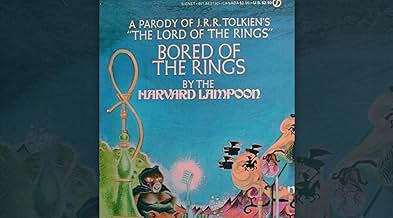Agrega una trama en tu idiomaA look at the history of the American comedy publication and production company, National Lampoon, from its beginning in the 1970s to 2010, featuring rare and never-before-seen footage.A look at the history of the American comedy publication and production company, National Lampoon, from its beginning in the 1970s to 2010, featuring rare and never-before-seen footage.A look at the history of the American comedy publication and production company, National Lampoon, from its beginning in the 1970s to 2010, featuring rare and never-before-seen footage.
- Premios
- 5 nominaciones en total
- Self
- (material de archivo)
- …
- Self - Lampoon Staff
- (as Judith Jacklin Belushi)
- Self
- (material de archivo)
- …
- Self - Lampoon Contributor
- (as Chris Cerf)
- Self
- (material de archivo)
- …
- Dirección
- Guionistas
- Todo el elenco y el equipo
- Producción, taquilla y más en IMDbPro
Opiniones destacadas
*** 1/2 (out of 4)
If you're a fan of the National Lampoon's magazine then you're certainly going to want to check this documentary out. The rise and fall of the magazine is discussed in this highly entertaining documentary that features interviews with surviving members of the magazine as well as those who got their start in the movies like NATIONAL LAMPOON'S ANIMAL HOUSE, CADDYSHACK and NATIONAL LAMPOON'S VACATION.
There's some really good material to have here but the documentary works the best for those who are unfamiliar with the magazine or just don't know the complete history behind it. We get some great stories about the early days as well as how the magazine finally took off, which of course led to Hollywood calling. There's some discussion of Saturday Night Live who stole a lot of their talent as well as some of the darker stories including the death of one of the founding members.
There are some great stories throughout this and there are some great interviews as well. I must say that the interview with Chevy Chase was probably my favorite because we really see a different side of him including a rather painful side as he talks about losing his best friend.
For those under about age 50 the National Lampoon is remembered for the movies that began in 1978 with the classic "Animal House" and then the series of "Vacation" movies, plus some others over the years not worth mentioning. The success of AH would continue the siphoning of the NL's most talented writers and performers (the NL Radio Show, which ran on Saturday evenings on a syndicated network, mostly AOR stations. Included Belushi, C Chase, Radner, Ramis and the Murray Bros.) which had begun with NBC's SNL. The NL couldn't compete with the money, fame and women that movies and TV offered their creative talent and the magazine died a slow death in the 80's. "DSBD" is a great look at this quick rise and fall of a comedy empire.
I probably started reading the Lampoon in the mid-70s - my favorite writers were Ellis Weiner and P.J. O'Rourke - but the documentary is most concerned with what it considers the magazine's glory days in the early 70s. Truthfully, the little bits of Lampoon stuff I've read by the early writers like Beard and O'Donoghue haven't really appealed to me, but the movie tells me they were amazing geniuses and perhaps they were.
The story the movie tells is a fairly superficial one. It gets into some of the drama and gives some nice background, but it sticks very closely to the geniuses-working-hard-and-having-fun. The decline is portrayed as the loss of geniuses to SNL and the movies, which seems simplistic, and there's not really much attempt to put the Lampoon into a larger societal context.
Which is fine, because it's an entertaining documentary, but for me it means people giving this 10 stars just have lower standards for a great documentary than I do. This is just a nice little history that fans of the magazine will enjoy. And it's probably pretty fun even if you don't know the magazine.
The film itself details new interviews with National Lampoon staff members and other famous people who were fans of the magazine itself. On top of these interviews detailing a lot of context into how founders and Harvard alumni Douglas Kenney, Henry Beard and Robert Hoffman approached producer Matty Simmons to make their own inspired rendition off of the Harvard Lampoon, there are also never-before seen archival material from former late players including John Belushi, Gilda Radner and Michael O'Donoghue. As a magazine done to comment on society and the world in the mosto outlandish ways, the documentary breathes so much life into the material through the photos, animated recreations of already existing Lampoon work and even some transitional parodies from their radio show. At its core, National Lampoon was about saying what no one else had the guts to talk about, and while they were the subject of possible racism and sexism, anyone who understood raw comedy and anger through laughter kept the magazine afloat for so long.
However, like most documentaries, it is also a chronicle of the biggest downfalls in the magazine's history, specifically related to Doug Kenney himself. Known for being as manic as he was brilliant, Kenney was known for unannounced AWOLs and frequent substance abuse which turned off some of his closest collaborators, not at all helped by his other experiments such as book and script writing being hit or miss. There are also talks of creative differences and bad behavior mentioned by Tony Hendra, Anne Beatts and Michael Gross. In spite of those, the main focus of the documentary is chronicling how a lot of the magazine took a downward spiral following Kenney's sudden death and newcomers being forced to go in directions that negatively affected the humor. Where National Lampoon was meant to say something absurd and shocking about a subject, its later years made it all shock without the substance. From numerous crazy additions, to film spin offs to different voices being heard, it's no wonder the magazine would stumble as much as it would triumph.
Through a lot of dedication to the most far out magazine of its time and arguably today, Drunk Stoned Brilliant Dead might be the best retelling of the National Lampoon the world will ever get. Despite the creative shortcomings the magazine would face later on, its impact on parody and satire will forever remain a staple of pop culture for years to come. If you're curious to check out the documentary, by all means give it a go, for you don't even need to be all that familiar with the original source material to get invested. As far as documentaries on controversial comedy go, this one is up there among the greats.
¿Sabías que…?
- TriviaComedians John Belushi, Chevy Chase, Gilda Radner, Bill Murray, Brian Doyle-Murray first gained attention as part of National Lampoon's stage and radio shows before gaining fame on Saturday Night Live. Michael O'Donoghue was a founder, writer, and editor for the National Lampoon magazine before becoming the first head writer of Saturday Night Live.
- Citas
Henry Beard, Himself: It was like we had an attic full of culture that had been accumulating from 1945 to 1970. And we opened the trap door and nobody had been up there. And we just basically looted it!
- Bandas sonorasThe Jean Genie
Written by David Bowie
Performed by David Bowie
Published by Tintoretto Music (BMI) administered by RZO Music, Inc., EMI Blackwood Music Inc. o/b/o EMI Music Publishing Ltd. (administered by Sony/ATV Music Publishing LLC.) and BMG Blue on behalf of Chrysalis Music Ltd.
Courtesy of RZO Music
Selecciones populares
- How long is Drunk Stoned Brilliant Dead?Con tecnología de Alexa
Detalles
- Fecha de lanzamiento
- Países de origen
- Sitios oficiales
- Idioma
- También se conoce como
- Drunk Stoned Brilliant Dead
- Productoras
- Ver más créditos de la compañía en IMDbPro
Taquilla
- Total en EE. UU. y Canadá
- USD 62,660
- Fin de semana de estreno en EE. UU. y Canadá
- USD 5,254
- 27 sep 2015
- Total a nivel mundial
- USD 62,660
- Tiempo de ejecución
- 1h 38min(98 min)
- Color

































